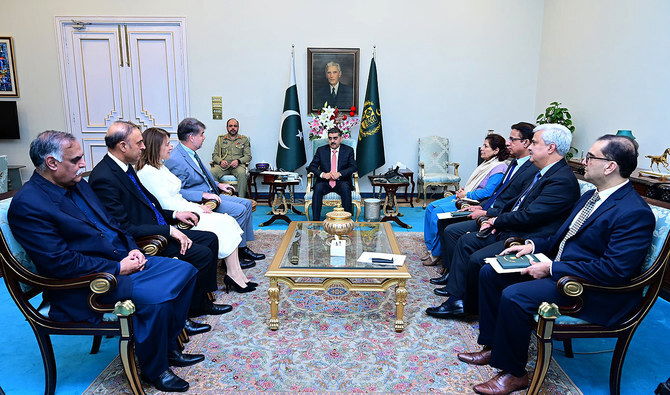IMF board expected to approve $700 million disbursement for Pakistan later today

- The board approved a much-needed, 9-month loan amounting to $3 billion in July to support economic stabilization program
- Experts say a clear economic roadmap can set the foundation for the next IMF program for Pakistan after the general elections
KARACHI: The Executive Board of the International Monetary Fund (IMF) is scheduled to meet today, Thursday, in Washington for the first review of a $3 billion short-term financing package and to consider the release of the $700 million second tranche to Pakistan.
The board had approved a much-needed, 9-month Stand-By Arrangement (SBA) for the country last year in July to support the government’s economic stabilization program. Pakistan also received the first tranche of $1.2 billion along with the endorsement for the loan program.
A visiting IMF delegation and Pakistani authorities reached a staff-level agreement (SLA) over the first review under the SBA in November, which was subject to the executive board’s approval to unlock the $700 million disbursement. Pakistani economists said they were hopeful the country would comfortably get access to the money after the SLA.
“There are big chances that the IMF board will easily grant approval for the disbursement of the funds to Pakistan because the country has successfully implemented the reforms and reached an SLA,” Dr. Sajid Amin, Deputy Executive Director at the Sustainable Development Policy Institute (SDPI), told Arab News.
Amin hoped the IMF board’s approval would help Pakistan’s national currency to regain some of its lost value, adding it would also have a positive impact on the country’s overall economic landscape.
Pakistan cleared the first review under the SBA after taking painful economic measures, including increases in energy prices and tax burden, which led to spiraling inflation that hit 38 percent in May last year. The prices of essential commodities still remain quite elevated.
As Pakistan prepares for the national election on Feb. 8, experts say it will have to chart a clear roadmap to run the economy.
“The next review of the program is important for Pakistan since it will lay down the foundation for the next IMF facility which the country will require,” Amin said.
Timely national elections and a well-thought-out economic gameplan by the next elected government will help secure the fresh IMF program and avoid any economic panic situation in the future, Amin argued.
Preparations for a follow-on program are likely to start after the conclusion of the current SBA in April 2024, as the country is scheduled to elect its new political leaders in the coming month.
Pakistan’s economic landscape has weathered a storm in recent years with fluctuating commodity prices, political turmoil and harsh blows dealt by floods.
The nation has been grappling with trade and current account deficits, mounting inflation and low foreign exchange reserves that exerted pressure on the currency that also hit historic lows against the United States dollar.